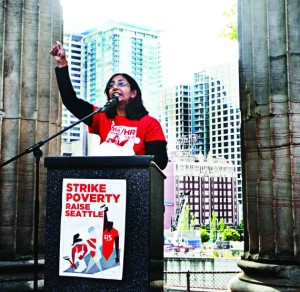Kshama Sawant, hostage-taker

By Dustin Hurst | Northwest Watchdog
$15 NOW: Sawant and her allies are about to take Seattle hostage.
The tea party is about to take a whole city hostage and threaten the health and viability of a regional economy worth billions of dollars annually.
All because of its hostile, hostage-taking approach to politics. Because the tea party can’t compromise or give ground, they’re tantamount to economic terrorists.
Oh, whoops. Forget that. That’s what we would hear if the tea party and conservative activists were as effective and demanding as Kshama Sawant, the socialist member of the Seattle City Council.
In case you haven’t been observing the machinations of a city tumbling toward progressive utopianism, here’s a short refresher: After winning a surprising election last fall, Sawant and her big union allies have demanded that Seattle raise its minimum wage to $15 an hour. Sawant, seizing the issue with all her might, threatened to take the proposal before voters in the fall if the council didn’t acquiesce to her rabid demands.
Mayor Ed Murray, a supporter of big government edicts himself, more or less agreed, but worked with union and business leaders to craft a proposal to raise the wage through a multi-year process.
It wasn’t good enough for Sawant, who decried the multi-year slide into the higher wage as a handout for big business and evidence of crony capitalism in the northwest’s Emerald City.
Sawant’s rise in Washington politics is an historic one, to be sure. She’s the only avowed socialist serving at any level of government in the country. That’s notable.
Yet, onlookers might not be able to help noticing similarities in Sawant and the rapid onset of the tea party in 2009 and 2010. Like Sawant, the tea party stormed to power in response to less-than-favorable policies of the ruling class. Sawant and the tea party used similar tactics and rhetoric, and both simply wouldn’t stop until their respective adversaries made some concessions.
Notable, too, is the differing media and political reactions to the tea party and Sawant.
During a fight over a debt limit vote in 2011, Vice President Joe Biden reportedly suggested tea party-backed Republicans, who sought steep cuts in government spending, acted like terrorists during budget negotiations. CNN’s Fareed Zakaria, never one to pull punches, echoed that sentiment on his TV show.
In another Capitol Hill bout, this one over Obamacare, Senate Majority Leader Harry Reid of Nevada said that tea partyers acted like hostage-takers.
Through the past few years, Democrats have repeated similar claims, suggesting the Republicans are willing to crash the American economy and threaten the good faith and credit of the United States if GOP lawmakers don’t get their way.
So it is with Sawant and her city, too. The media, though, haven’t really seemed to notice.
Seattle Times opinionator Johnathon Martin recently praised Sawant for her ability to strike quickly and effectively. He correctly explains that Sawant, a political upstart, has shined because of her organizing acumen.
In his love letter, though, Martin failed to mention that upping the minimum wage to $15 an hour overnight, as Sawant seeks, comes with risks — big ones. Slate business and economics writer Jordan Weismann, a fan of raising the minimum wage, suggested in a recent piece that Sawant’s plan could crash Seattle’s economy.
“If it succeeds, it could mean a profound shift in how we think about worker pay,” Weismann wrote. “If not, Seattle will have taken out the idea for a test drive. Better that one city’s job market crash than a whole country’s.”
Well, yes.
The head explainer over at Vox, Ezra Klein, went so far as to say that minimum wage “haters” should watch the Seattle process with excitement, suggesting it could provide strong evidence for the rest of the country.
“Nevertheless, this will be a good test,” Klein wrote. “Both supporters and opponents of a higher minimum wage should be eager to see how it comes out.”
As a quick aside, I’m eagerly awaiting Klein’s brainy explanation as to why this experiment was a good one to the workers who will have lost their jobs when this is all over.
Perhaps the only real rebuke — if you want to call it that — of the plan came from the Seattle Times editorial board. The paper trained its fire on Murray, not Sawant, and said that the City Council should ease Seattle into the new wage.
Notice a trend? In the days following Murray’s May 1 announcement that he would push for the higher wage floor, Sawant escaped unscathed in the media, despite her overly aggressive hostage-taking tactics. Many in the media, including Klein, have rushed to endorse the high wage and give the city glowing coverage.
While the media is certainly in Sawant’s corner, she boasts one fan on the other side of the political spectrum: Freedom Foundation labor analyst Max Nelson.
Nelson’s fandom of Sawant isn’t for her ideological positions and socialist values. He’s diametrically opposed to nearly everything the City Council member believes.
He is, though, impressed by Sawant’s moxie and commitment to her platform.
“They are playing hardball politics, firing up their grassroots and using the issue to try and build a movement,” Nelson told Northwest Watchdog about Sawant and her group, $15 Now. “Sure, they irritate the heck out of the City Council, which resents being boxed in, but it’s working.”
“I would be thrilled if the tea party was this effective,” he said.
Maybe if the tea party had the media in its back pocket, it could be.
Contact Dustin Hurst at Dustin@Watchdog.org







